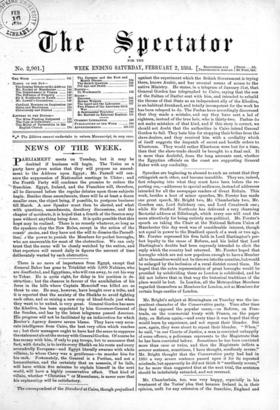Speeches are beginning to abound to such an extent that
they extinguish each other, and become inaudible. They are, indeed, fast relapsing into what they must have been before the re- porting era,—addresses to special audiences, instead of addresses intended for all the newspaper readers of Great Britain. This week, besides a host of minor speeches, Mr. Forster has made one great speech, Mr. Bright two, Mr. Chamberlain two, Mr. Goschen one, Lord Salisbury one, and Lord Cranbrook one ; while Sir Stafford Northcote has delivered a very charming Rectorial address at Edinburgh, which every one will read the more attentively for being entirely non-political. Mr. Forster's speech on taking the Chair at the National Reform Union of Manchester this day week was of considerable interest, though not equal in power to the Bradford speech of a week or two ago. Mr. Forster expressed his firm faith in Lord Hartington's per- fect loyalty to the cause of Reform, and his belief that Lord Hartington's doubts had been expressly intended to elicit the reply which the country had returned. Mr. Forster hoped that boroughs which are not now populous enough to have a Member all to themselves would not be thrown into the counties, but would be enlarged by the inclusion of a rural district round them. He hoped that the extra representation of great boroughs would be provided by subdividing them as London is subdivided, and he did not believe that in that way the historical traditions of the place would be lost. In London, all the Metropolitan Members regarded themselves as Members for London, not as Members for certain huge cantles of London.


































